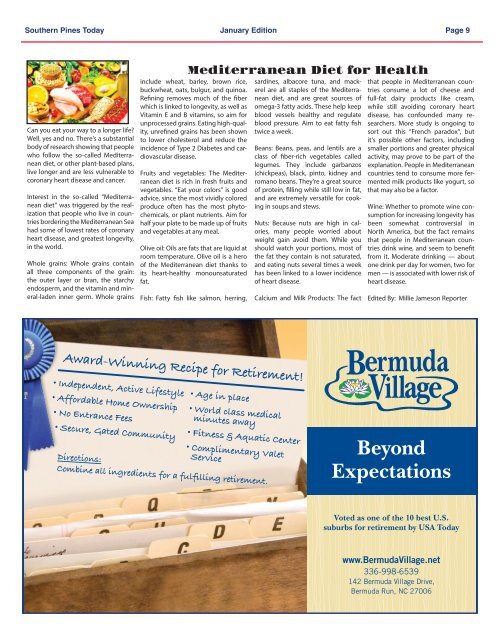You also want an ePaper? Increase the reach of your titles
YUMPU automatically turns print PDFs into web optimized ePapers that Google loves.
were stuffed and Dugans Pub, triples<br />
minute to thank all of the volunteers<br />
their contents.<br />
Presented To<br />
that make Back Pack Pals possible.<br />
Alan Riley<br />
There are many volunteers that pick<br />
Back Pack Pals began in 2005, whereby<br />
program Pines sends Today needy kids<br />
<strong>Jan</strong>uary Owner Edition drop off to schools and much Page more. 9<br />
up an deliver, the packs, stock shelves,<br />
Southern<br />
By: Millie Jameson Staff Reporter<br />
Can you eat your way to a longer life?<br />
Well, yes and no. There’s a substantial<br />
body of research showing that people<br />
who follow the so-called Mediterranean<br />
diet, or other plant-based plans,<br />
live longer and are less vulnerable to<br />
coronary heart disease and cancer.<br />
Interest in the so-called “Mediterranean<br />
diet” was triggered by the realization<br />
that people who live in countries<br />
bordering the Mediterranean Sea<br />
had some of lowest rates of coronary<br />
heart disease, and greatest longevity,<br />
in the world.<br />
Whole grains: Whole grains contain<br />
all three components of the grain:<br />
the outer layer or bran, the starchy<br />
endosperm, and the vitamin and mineral-laden<br />
inner germ. Whole grains<br />
Mediterranean Diet for Health<br />
include wheat, barley, brown rice,<br />
buckwheat, oats, bulgur, and quinoa.<br />
Refining removes much of the fiber<br />
which is linked to longevity, as well as<br />
Vitamin E and B vitamins, so aim for<br />
unprocessed grains. Eating high-quality,<br />
unrefined grains has been shown<br />
to lower cholesterol and reduce the<br />
incidence of Type 2 Diabetes and cardiovascular<br />
disease.<br />
Fruits and vegetables: The Mediterranean<br />
diet is rich in fresh fruits and<br />
vegetables. “Eat your colors” is good<br />
advice, since the most vividly colored<br />
produce often has the most phytochemicals,<br />
or plant nutrients. Aim for<br />
half your plate to be made up of fruits<br />
and vegetables at any meal.<br />
Olive oil: Oils are fats that are liquid at<br />
room temperature. Olive oil is a hero<br />
of the Mediterranean diet thanks to<br />
its heart-healthy monounsaturated<br />
fat.<br />
Fish: Fatty fish like salmon, herring,<br />
sardines, albacore tuna, and mackerel<br />
are all staples of the Mediterranean<br />
diet, and are great sources of<br />
omega-3 fatty acids. These help keep<br />
blood vessels healthy and regulate<br />
blood pressure. Aim to eat fatty fish<br />
twice a week.<br />
Beans: Beans, peas, and lentils are a<br />
class of fiber-rich vegetables called<br />
legumes. They include garbanzos<br />
(chickpeas), black, pinto, kidney and<br />
romano beans. They’re a great source<br />
of protein, filling while still low in fat,<br />
and are extremely versatile for cooking<br />
in soups and stews.<br />
Nuts: Because nuts are high in calories,<br />
many people worried about<br />
weight gain avoid them. While you<br />
should watch your portions, most of<br />
the fat they contain is not saturated,<br />
and eating nuts several times a week<br />
has been linked to a lower incidence<br />
of heart disease.<br />
Calcium and Milk Products: The fact<br />
that people in Mediterranean countries<br />
consume a lot of cheese and<br />
full-fat dairy products like cream,<br />
while still avoiding coronary heart<br />
disease, has confounded many researchers.<br />
More study is ongoing to<br />
sort out this “French paradox”, but<br />
it’s possible other factors, including<br />
smaller portions and greater physical<br />
activity, may prove to be part of the<br />
explanation. People in Mediterranean<br />
countries tend to consume more fermented<br />
milk products like yogurt, so<br />
that may also be a factor.<br />
Wine: Whether to promote wine consumption<br />
for increasing longevity has<br />
been somewhat controversial in<br />
North America, but the fact remains<br />
that people in Mediterranean countries<br />
drink wine, and seem to benefit<br />
from it. Moderate drinking — about<br />
one drink per day for women, two for<br />
men — is associated with lower risk of<br />
heart disease.<br />
Edited By: Millie Jameson Reporter

















